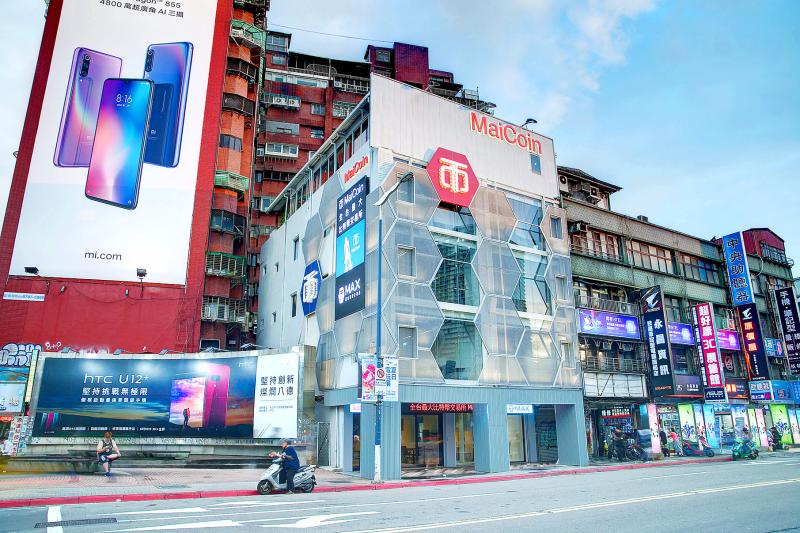Cryptocurrency exchange MaiCoin Ltd (現代財富科技) has submitted an anti-money laundering compliance statement to the Financial Supervisory Commission after the regulator last week required all eight cryptocurrency trading platforms in Taiwan to submit compliance statements by the end of next month.
MaiCoin is the first local exchange to have sent the compliance document to the commission. Other exchanges must file before the deadline or face a fine of between NT$500,000 and NT$10 million (US$17,943 and US$358,860), the commission said yesterday.
The government has imposed specific regulations on local cryptocurrency exchanges to prevent them from being used by money launderers, signaling that the government has attached more importance to the cryptocurrency business, MaiCoin CEO Alex Liu (劉世偉) said in a statement yesterday.

Photo courtesy of MaiCoin Ltd
A healthy ecosystem of cryptocurrency would allow exchanges to provide diverse and innovative services for consumers and to create a safe, convenient trading environment, Liu said.
MaiCoin, Taiwan’s largest cryptocurrency exchange, said the number of registered accounts had surpassed 650,000 as of the end of last month, accounting for more than 60 percent of combined accounts of all cryptocurrency exchanges.
The company has since 2018 operated a division that focuses on risk control and money laundering activities. The division also helps communicate with authorities and inspects the exchange’s internal controls against money laundering, together with Deloitte & Touche Taiwan (勤業眾信聯合會計師事務所) and PricewaterhouseCoopers (PwC) Taiwan (資誠聯合會計師事務所), it said.
The demand for compliance documents represents the commission’s latest effort to regulate cryptocurrency businesses after the regulator on July 1 imposed new anti-money laundering regulations that require trading platforms to report transactions valued at more than NT$500,000.
Some cryptocurrency exchanges have reportedly decided to halt their operations due to the new regulations and would not file compliance statements to the commission, the Chinese-language Commercial Times reported.

SEASONAL WEAKNESS: The combined revenue of the top 10 foundries fell 5.4%, but rush orders and China’s subsidies partially offset slowing demand Taiwan Semiconductor Manufacturing Co (TSMC, 台積電) further solidified its dominance in the global wafer foundry business in the first quarter of this year, remaining far ahead of its closest rival, Samsung Electronics Co, TrendForce Corp (集邦科技) said yesterday. TSMC posted US$25.52 billion in sales in the January-to-March period, down 5 percent from the previous quarter, but its market share rose from 67.1 percent the previous quarter to 67.6 percent, TrendForce said in a report. While smartphone-related wafer shipments declined in the first quarter due to seasonal factors, solid demand for artificial intelligence (AI) and high-performance computing (HPC) devices and urgent TV-related orders

BYPASSING CHINA TARIFFS: In the first five months of this year, Foxconn sent US$4.4bn of iPhones to the US from India, compared with US$3.7bn in the whole of last year Nearly all the iPhones exported by Foxconn Technology Group (富士康科技集團) from India went to the US between March and last month, customs data showed, far above last year’s average of 50 percent and a clear sign of Apple Inc’s efforts to bypass high US tariffs imposed on China. The numbers, being reported by Reuters for the first time, show that Apple has realigned its India exports to almost exclusively serve the US market, when previously the devices were more widely distributed to nations including the Netherlands and the Czech Republic. During March to last month, Foxconn, known as Hon Hai Precision Industry

Taiwan Semiconductor Manufacturing Co (TSMC, 台積電) and the University of Tokyo (UTokyo) yesterday announced the launch of the TSMC-UTokyo Lab to promote advanced semiconductor research, education and talent development. The lab is TSMC’s first laboratory collaboration with a university outside Taiwan, the company said in a statement. The lab would leverage “the extensive knowledge, experience, and creativity” of both institutions, the company said. It is located in the Asano Section of UTokyo’s Hongo, Tokyo, campus and would be managed by UTokyo faculty, guided by directors from UTokyo and TSMC, the company said. TSMC began working with UTokyo in 2019, resulting in 21 research projects,

Quanta Computer Inc (廣達) chairman Barry Lam (林百里) yesterday expressed a downbeat view about the prospects of humanoid robots, given high manufacturing costs and a lack of target customers. Despite rising demand and high expectations for humanoid robots, high research-and-development costs and uncertain profitability remain major concerns, Lam told reporters following the company’s annual shareholders’ meeting in Taoyuan. “Since it seems a bit unworthy to use such high-cost robots to do household chores, I believe robots designed for specific purposes would be more valuable and present a better business opportunity,” Lam said Instead of investing in humanoid robots, Quanta has opted to invest